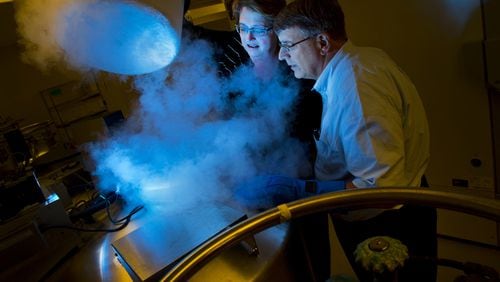South Florida’s ethnic diversity will play a key role in an ambitious, five-year medical research effort aimed at making treatments and drugs more effective by tailoring them to the lifestyles, genetics and environment of individual patients.
Led by the University of Miami’s Miller School of Medicine and funded by a $60 million grant from the National Institutes of Health, a group of academic institutions in Florida and Georgia — including the University of Florida, Emory University, and Morehouse School of Medicine — have begun to recruit 100,000 people from the Southeastern United States to participate in a nationwide research program called “All of Us.”
The program’s goal is to recruit one million or more U.S. residents over the next five years — including 40,000 from South Florida — to help create a rich pool of data that will account for individual differences in genetics, behavior and geography in biomedical research. That database will then be used for future studies into a wide variety of health conditions and to help scientists develop more precise medical interventions.
Until now, most biomedical research has been conducted primarily with non-Hispanic white subjects, mostly men, though the U.S. Census shows that minorities make up nearly 40 percent of the population.
“It’s not enough to study just one kind of people,” said Dr. Stephan Züchner, principal investigator for the All of Us program’s South East Enrollment Center and chair of UM’s Department of Human Genetics. “It’s very important that we understand the genomes of all people on the planet.”
For instance, he said, people from Southeast Asia tend to have fast metabolisms, which causes certain drugs to have little or no effect on them.
“In Mexico,” he said, “there’s a much higher risk to develop diabetes. We don’t know why. But it might well have to do with genetics.” Similarly, Züchner added, “We cannot treat African Americans accordingly if we do not realize they have a higher risk for certain cardiovascular disorders.”
The program is open to all adults, regardless of race or ethnicity, health status, education or income level. Anyone interested in participating can sign up through the All of Us online portal at www.joinallofus.org/en.
Those selected will receive genomic sequencing. But scientists want to understand more than genetics. They want to figure out how individual behaviors, such as exercising, smoking or overeating, and a person’s environment, from the climate to the availability of fresh fruits and vegetables, affect the way genetics function, said Dr. Olveen Carrasquillo, a lead researcher for the program and an internal medicine physician with the UM Health System.
“Health is composed of many things,” he said. “But we don’t know the right balance of these things and how they contribute to health and health outcomes.”
Carrasquillo said the All of Us program will follow participants for at least five years and collect a wide range of data from them, including any diagnosed diseases, medications they’re taking and diet, with the aim of helping researchers one day figure out what medicines work best for individual patients based on their unique traits.
“It’s a much more nuanced approach to treatment that’s really much more targeted for that individual person,” Carrasquillo said.
The NIH and researchers will hold conferences over the coming years to decide next steps for studying participants. One idea that has gained traction is using technology, such as wearable activity trackers and electronic health records, to measure participants’ behaviors and gather their information.
Züchner said patient data collected as part of the All of Us program will be safeguarded and used only by researchers. “This is as good as it gets when it comes to data protection,” he said.
Studying a million people also may produce better research results than prior studies because of the unprecedented scale, Züchner said. And though he expects it will take a decade or longer before biomedical researchers can make good use of the data — perhaps too long for participants to benefit personally — Züchner believes the effort will be worth it in the long run.
“It’s almost like you invest a little bit, you give a little bit of your personal data,” he said, “so your children and your family will benefit from it.”






